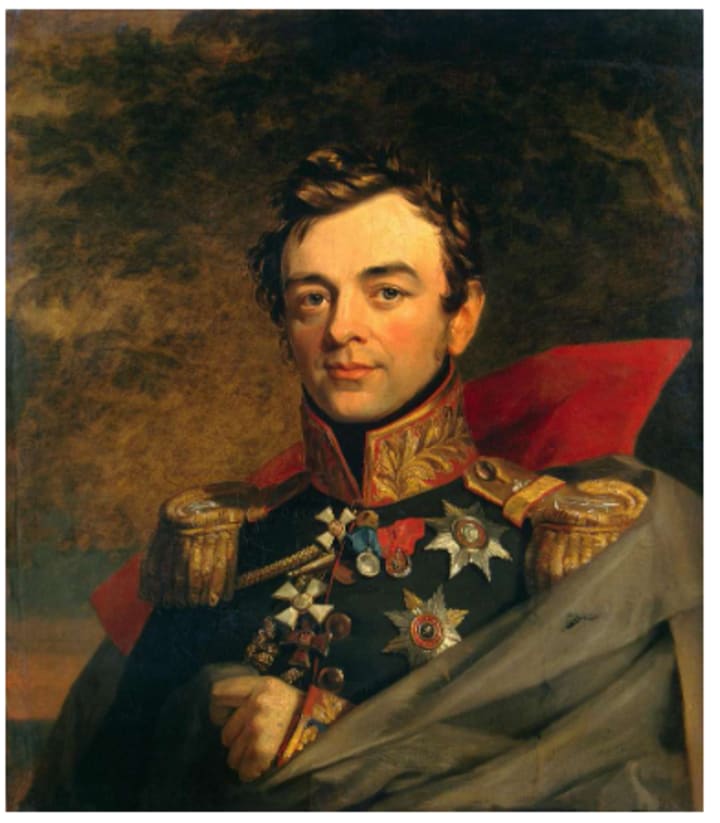The Russo-Persian War of 1827: Shaping Armenia's Geopolitical Landscape for Centuries
In this article, we will delve into the geopolitical consequences of this event, which persistently influence the contemporary situation in Armenia. The year 1827 represented a pivotal moment in Armenian history, as the Russo-Persian War led in significant geopolitical shifts in the region. For more than a thousand years, Armenia had been under Muslim rule, but the capture of Yerevan by the Russian army, commanded by General Ivan Paskevich, signified the conclusion of this era. It’s crucial to grasp the historical backdrop of Armenia's period of Muslim control. Armenia, one of the world's most ancient Christian nations, confronted centuries of political turmoil and foreign governance. It underwent different phases of Persian and Byzantine rule, but it was the arrival of Islam in the 7th century that initiated a thousand-year period of Muslim control. Throughout this era, Armenia found itself strategically located at the junction of empires, frequently serving as a battleground for the dominant powers in the region. The Arab Caliphate, the Seljuk Turks, and then the Safavid and Qajar dynasties of Persia proclaimed control over Armenian territories, while the Armenian populace struggled to preserve their cultural and religious heritage. On October 1, 1827 (or September 13, 1827 by the Julian calendar), during the Russo-Persian War of 1826-1828, the Russian Army, led by General Ivan Fyodorovich Paskevich, successfully captured Yerevan, the capital city of Eastern Armenia, after a seven-day siege. This expansionist drive later played a role in escalating tensions between Russia and the Ottoman Empire, which in turn reshaped the geopolitical landscape of the area. Recently, Nagorno-Karabakh has once again become a source of ongoing tension and conflict. The primary parties in this territorial dispute are Armenia and Azerbaijan, and it's an area where the geopolitical interests of several countries, including Iran, Turkey, and Russia, are at stake. This makes Nagorno-Karabakh a crucial hotspot in the geopolitics of the South Caucasus.

The year 1827 marked a momentous turning point in Armenian history, as the Russo-Persian War triggered significant geopolitical shifts in the region. Armenia had endured over a thousand years of Muslim rule, but the capture of Yerevan by General Ivan Paskevich's Russian army signified the end of this era. In this article, we will delve into the enduring geopolitical consequences of this pivotal event, which continue to influence contemporary Armenia.
A Millennium of Muslim Governance:
To fully appreciate the significance of 1827, it's essential to understand the historical backdrop of Armenia's lengthy period under Muslim control. As one of the world's oldest Christian nations, Armenia grappled with centuries of political turmoil and foreign domination. It experienced alternating phases of Persian and Byzantine rule, but it was the advent of Islam in the 7th century that initiated a thousand-year period of Muslim dominion.
Throughout this era, Armenia found itself strategically situated at the crossroads of empires, frequently serving as a battleground for dominant regional powers. The Arab Caliphate, the Seljuk Turks, and subsequently, the Safavid and Qajar dynasties of Persia, asserted control over Armenian territories, while the Armenian people struggled to preserve their cultural and religious heritage.
The Russo-Persian War of 1827:
The Russo-Persian War of 1826-1828 played a pivotal role in shaping the history of Armenia and the broader Caucasus region. This conflict was part of the larger geopolitical rivalry between the Russian Empire and the Persian Empire, both vying for dominance and control in the South Caucasus.

In 1827, General Ivan Paskevich led the Russian army in a decisive assault on Yerevan, the capital of the Erivan Khanate, then under Persian rule. This event marked a significant transformation in the geopolitical dynamics of the area, bringing an end to centuries of Muslim governance over Armenian territories.
Geopolitical Implications:
Russian Expansionism:
On October 1, 1827 (or September 13, 1827, according to the Julian calendar), the Russian Army, led by General Ivan Fyodorovich Paskevich, successfully captured Yerevan after a seven-day siege. This move reflected Russia's ambitions for expansion in the Caucasus region.
Russia aimed to secure a presence in the South Caucasus and access to the Black Sea and the Mediterranean, sparking tensions with the Ottoman Empire and reshaping the region's geopolitics.
Armenian Liberation:
For Armenians in Yerevan and nearby areas, the Russian arrival was seen as a liberating force, ending years of Persian rule and potentially safeguarding their cultural and religious traditions. This marked the beginning of Russian-Armenian relations, shaping Armenia's foreign policy today.
Treaty of Turkmenchay:
The Treaty of Turkmenchay, signed in 1828, ended the Russo-Persian War and compelled Persia to cede Armenian territories to Russia. These regions now constitute present-day Armenia, part of Azerbaijan, Nakhchivan, and Iğdır Province in Turkey, further cementing Russia's presence in the region.
Please CLICK HERE for getting Historical News based on Geopolitical viewpoints.
Religious Shifts:
The shift from Muslim to Christian control had profound religious consequences for Armenia, reshaping its cultural and religious identity. The reestablishment of Armenian Christianity marked a significant transformation.
Ongoing Tensions:
The events of 1827 and subsequent geopolitical changes left a legacy of unresolved conflicts and tensions in the Caucasus region. The Nagorno-Karabakh conflict between Armenia and Azerbaijan is a prime example, highlighting the complex dynamics at play.
Modern Geopolitical Realities:
Today, Armenia navigates a complex geopolitical landscape, partly shaped by the events of 1827:

Russian-Armenian Relations:
Armenia maintains close ties with Russia, hosting a Russian military base that provides security but raises questions about sovereignty and dependence on a powerful neighbor.
Regional Conflicts:
Ongoing disputes, such as the Nagorno-Karabakh conflict, strain relations with Azerbaijan and Turkey, rooted in the shifting geopolitics of the 19th century.
Iranian Influence:
Armenia shares historical and cultural ties with Iran, influencing both cultural and economic aspects of Armenia's identity.
European Ambitions:
Armenia seeks to strengthen relations with Europe and the European Union to diversify its foreign ties and reduce dependence on any single major power.
Conclusion:
Armenia's history as a buffer state in a complex web of geopolitics has been deeply shaped by the Russo-Persian War of 1827. This pivotal event, marking the end of a millennium of Muslim rule, continues to reverberate in Armenia's contemporary geopolitics. The region's ongoing conflicts and tensions highlight the enduring legacy of this historic moment and the intricate geopolitical dynamics at play in the South Caucasus.
Please CLICK HERE for getting Historical News based on Geopolitical viewpoints.
About the Creator
Mohammed Shahidullah-Bin-Anwar
Mohammed Shahidullah, a Blogger, writes on Historical News. After completing Master's in Bengali from Dhaka University, I accumulated over 15 years of experience in various private companies. Plz visit TIME PRINTER, you will not be upset.
Enjoyed the story? Support the Creator.
Subscribe for free to receive all their stories in your feed. You could also pledge your support or give them a one-off tip, letting them know you appreciate their work.






Comments
There are no comments for this story
Be the first to respond and start the conversation.